It is no exaggeration to say that a healthy digestive system is the foundation of the health of the whole body.
content
What do you know about the child's digestive system?
Baby care: 4 important parts that mothers need to pay attention to
Caring for the baby: 8 signs of "denouncing" the baby is not feeling well
Myths about baby care products
5 smells children should stay away from
Be careful when using wind oil for your baby
Baby care: Basic first aid you need to know
What do you know about the child's digestive system?
1. My stomach is strong, my baby develops comprehensively
Only when provided with enough nutrients, the baby can develop physically and intellectually. This means that, when taking care of the baby, the mother needs to ensure that the child's digestive system is always in a good state of "running".
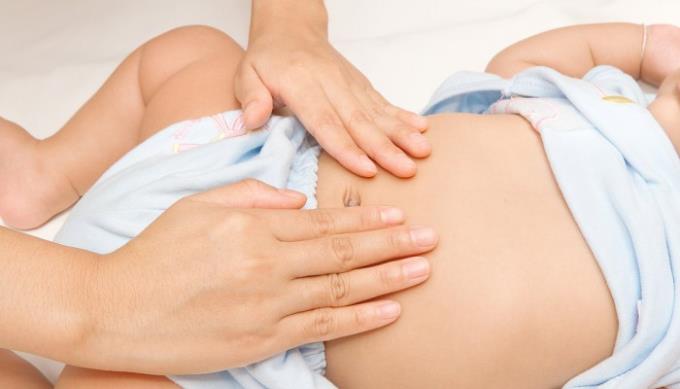
My stomach is strong, I will grow up soon, mom!
It is not about how the digestive system supports the height and weight development of the child. In fact, it is too obvious, nutrition accounts for 32% of the factors that have the greatest influence on a child's growth. Children eat right, eat well, absorb well nutrition, surely will grow tall quickly.
So how does the digestive system affect the child's immune system? Along the intestinal wall, the lymph nodes perform the task of "training" immune cells for the body. Healthy intestine, new lymph nodes are strong enough to help immune cells become healthy, increase resistance by up to 80%.
What about the brain? The digestive system affects the child's brain formation by directly providing nutrients to help the brain develop, such as folic acid, iron, zinc, calcium, DHA, omega 3 ... In addition, between The brain and digestive system have a close relationship through the brain axis, helping these two parts "progress" together.
However, in the first year of life, the infant 's digestive system is still weak. Therefore, it is not surprising that most babies experience vomiting, flatulence, abdominal pain, diarrhea , constipation ... Prolonged illness causes malnutrition and many other disease risks. Therefore, the mother's duty when taking care of the baby is to help keep the baby's digestive system healthy.
2. For your baby's digestive system to stay healthy, you need:
Feeding the baby properly: You should not feed your baby too soon, the best age for your baby to start learning to eat is 6 months old. At first, let your baby get used to it gradually, from little to medium, and eventually increase gradually when the baby gets used to it. The infant's digestive system also takes time to get used to a variety of new foods.
Always add high-fiber foods to your child's daily diet: Not only helps to purify food in the digestive system, fiber also assists in the process of accumulating energy and nutrients, pushing residual waste. go out.
Practice your baby to drink water on demand: Children 6 months old can practice drinking water. Depending on the age, mothers can give babies different amounts of water. The addition of more fluids helps improve the digestive system, and at the same time supports the absorption and secretion process more smoothly. The risk of constipation is therefore also significantly reduced.
Pay attention to food safety and hygiene when taking care of your baby. Absolutely do not give your baby unripe, undercooked food, because bacteria will immediately attack the baby. At the same time, children should only eat foods suitable for their age.
Not only the digestive system, mothers should also pay attention to the following 4 parts that will affect the child's development.
Baby care: 4 important parts that mothers need to pay attention to
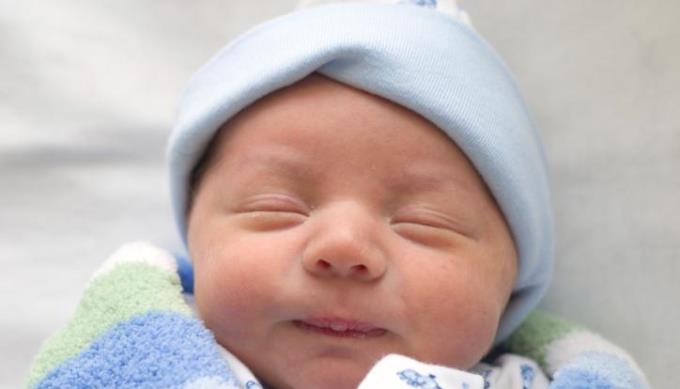
Tents, umbilical cord, scalp and genitals are the 4 locations on the baby's body that mothers need most attention.
1. The upper part of the head
Partly because the baby's skull has not yet connected to each other and creates a depression, partly to fit the narrow "way out" from the uterus, every newborn baby's head has a thinner. Divided into anterior and posterior fontanelle, when the baby was 3 months old, the cranial joint healed again, causing the posterior to disappear. It takes longer for the fore to take longer, and it has to be waited until the baby is more than a year old to officially become strong, immediately.
Usually, mothers have very limited impact on this part of the baby. Seeing the sinus move with each breath, any mother does not feel worried and confused. In reality, however, the mother doesn't need to be so scared. Above the fontanelle, there is inherently a very thick film that protects it extremely well. Just when taking care of the baby, the mother does not work hard, this membrane is absolutely not harmed.
2. Dead skin on the head, also known as "buffalo shit"
Many newborn babies, after a few days of being born, often appear a brown dead skin layer on their heads, according to folklore or called "buffalo shit". This dead skin layer, if not cared for carefully, is easy to peel and cause scalp bleeding when bathing or brushing.
To get rid of this unpleasant "buffalo shit" class, mothers should find specialized products for babies, at pharmacies or children's stores. This liquid helps to soften dead skin, causing it to slowly peel off gently and without leaving a trace. Absolutely do not use a brush or peel dead skin, the baby may hurt and damage the skin.
3. The baby's umbilical cord
The newborn baby's navel is the part to pay special attention to and needs to be kept dry and airy often. When changing diapers, be careful not to get urine and stools in your baby's navel. When bathing your baby, mothers should not let water stay in the navel for too long, and should use a soft gauze soaked in specialized alcohol solution to clean the baby's navel after bathing.
Whenever you see signs of unusual signs of the umbilical cord such as redness, oozing ..., you should immediately bring your baby to the doctor for timely examination.
4. Anus and genitals
In the process of taking care of your baby during the hot season, if you do not pay attention, let your child wear a diaper containing feces or urine for too long, which can cause infection and diaper rash. Ideally, you should combine using both diapers and diapers in the hot season to limit this situation.
After the baby defecates, mothers should use soft towels and warm water to clean the baby. After drying the baby is finished, you should take a little time to let your baby "dry" naturally, should not wear diapers or pants immediately.
Of course, taking care of your baby requires a lot of your attention. This means you also have to look for abnormalities in your baby.
Caring for the baby: 8 signs of "denouncing" the baby is not feeling well
1. The child's mood is erratic
Your kids are happy, sad, easy to cry, easy to laugh? Maybe the baby's body is lacking in quality, mom. Your brain needs amino acids to keep your mind happy and optimistic. Without protein, the body does not produce enough amino acids to ensure a stable mood. So, mothers must not forget to add enough protein to their daily needs!
Protein-rich foods: Beef, pork, chicken ...
2. Babies get angry easily, irritable
Emotional stability is also highly dependent on the amount of healthy fats in the body. If your baby is impatient, easily angry, he or she may be lacking in fat, especially omega-3. You should feed your baby at least 3 servings of fatty fish per week, including salmon, herring, and mackerel.

Irritability and irritability are also negative signs of your health
3. Children speak slower than their peers
The cause of slow speech may be due to the lack of vitamin B12, minerals found in foods such as beef, chicken, pork, shrimp, fish, milk, eggs. Mom should increase your baby's intake of these foods to create momentum for your child's language skills!
4. Your baby is overly active
Active, playful children are completely normal. However, if the baby is naughty or mischievous, the cause is often related to the child's brain's ability to connect and process information. Active children often have poor digestion, due to less beneficial bacteria in the intestinal tract, affecting the absorption of nutrients from food.
To enhance the health of the baby's digestive system, when taking care of the baby, mothers should limit the use of many processed foods, canned food, too much flavoring and coloring. At the same time, you should give your baby more yogurt to increase beneficial bacteria.
5. Children with cavities
Not only due to eating a lot of sweets, tooth decay is also the result of the lack of minerals and vitamins needed to assimilate minerals. Therefore, mothers should supplement their child's daily diet with foods rich in phosphorus, fat-soluble vitamins to prevent tooth decay .
6. Children often get colds
A weak immune system leads to frequent colds in young children. Among them, the main cause is still lack of nutrition and reasonable inactivity. Only when eating healthy and exercising, the child's immune system is healthy enough to prevent and fight disease.
7. Baby is lazy to think
If pregnant women are not provided with enough nutrition, it will easily affect the child's brain development in the future. If there are deficiencies in nutrition during pregnancy, after giving birth, mothers should increase supplementation while breastfeeding and take care of the baby in the first years of life.
Lack of healthy fats, especially omega-3, the development of a child's brain will slow down, children become lazy to think, always lazy and rarely want to explore and explore. Mom should pay careful attention to this issue!
8. Baby's skin and hair are dry
When the body does not have enough fat-soluble vitamins such as A, D, E and K2, it causes dry skin and hair to split and split ends. If you add enough of these micronutrients in the meal, mothers will see a significant change from the baby's hair to the baby's skin, shiny and softer.
Myths about baby care products
1. Natural products are safe products
Not everything that is extracted from natural herbs or minerals is safe for babies. In addition, manufacturers can completely reduce artificial chemicals in product ingredients. If you do not read the information carefully, you can "pick up" about the perpetrators of asthma, hormone disorders and many other problems for children.
If you find talc in baby powder or baby cosmetics, leave them on the supermarket shelf. Other chemicals to avoid include Proplyene glycol; 1,4-dioxane and ethylated surfactants; Mineral oils, parabens, triclosans, polypropylene glycol, benzoic acid, propyl esters, perfumes or fragrances.
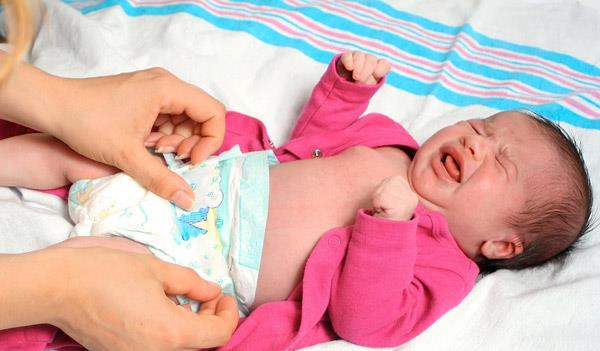
Any baby care product can benefit or harm your baby depending on the wisdom of parents.
2. Homemade products are good
A common mentality among consumers is doubting the safety of store-sold foods. With food safety alarms, it's easy to think that homemade products will be safer than commercially available products.
In fact, you can still find good products with clear certification of origin and manufacturing process. For example, vegetables meeting Viet GAP or Global GAP standards, fish meats certified for safe slaughter, foods in BPA-free plastic packaging ...
3. Holding the baby only makes the baby braided
The idea of a baby being braided and bawdy has become outdated. Modern mums can take their babies anywhere with a comfortable and soothing cloth carrier. Being close to your baby also helps the baby's mental development a lot.
4. Baby clothes are a must to be lovable
Yes, but safety is the most important criterion. Children's clothes should be made from 100% cotton, free from chemicals that are dangerous to baby's health. Note, you need to wash all clothes, bedding or utensils that contact the baby's skin before using.
5. Safety protection products are safe
Are you sure you can buy products that are not defective or from reputable manufacturers? Need to research the product carefully before buying. It may no longer meet current safety standards. Pay special attention when buying used products such as cribs, cribs, stair blocking ...
6. Non-spicy eye shampoo contains anesthetic
There is a "legend" that the baby shampoos do not make babies cry because they contain some kind of anesthetic. However, the fact is, they do not contain a type of foaming agent called sodium lauryl sulphate. The absence of this substance also helps to increase the safety of the shampoo because it has the potential to cause cancer.
7. Formula milk is more nutritious than breast milk
The formula that flood the market is touted as the best baby food. In fact, experts believe that breast milk is the only food that should be given to babies under 6 months. Breast milk contains all kinds of nutrients that formulas have tried to emulate. However, no formula has the same antibodies as breast milk.
5 smells children should stay away from
1. Tobacco smoke
Tobacco smoke directly threatens the baby's respiratory system, oral cavity, nervous system. Moreover, the baby becomes short of breath, has a risk of tooth decay, impaired hearing, and mental retardation. Mom should encourage family members to quit smoking to ensure the child's safety!
2. The smell of perfume
When taking care of the baby, mothers often apply perfume to the mosquito bitten skin to avoid swelling and healing. However, depending on the type, there are too many strong odors, containing irritating chemicals in the ingredients, which can threaten your baby's health.
At this time, the body's reaction is to make the baby headache, dizziness, allergies, rhinitis, sore throat. In addition, the unsafe chemical composition more or less stimulates some part on the baby's brain, causing negative effects.
3. Flower fragrance

Some flowers have an irritating odor, while pollen is also prone to allergies
Not only children, adults can also be allergic to some fragrances of flowers. Accordingly, the consequences are often allergies, insomnia, hair loss, cough, headache. Orchids, flowers of shame, hyacinth flowers, zucchini, azaleas ... mothers should not let the baby smell, especially for sensitive children, easily irritated, affected with smell, strange taste.
4. Camphor
Most families put a few camphor pills in the closet to avoid cockroaches and termites. If too much exposure to this smell, the baby is very susceptible to jaundice.
Components in camphor are highly toxic, only the adult body is able to excrete these substances out. So when taking care of the baby, you should not put camphor in the child's locker, and reduce the number of camphor pills in the couple's wardrobe.
5. Smoke car
When taking your baby out on a motorbike ride, exposure to polluted vehicle smoke is inevitable. Vehicle smoke contains a lot of CO, CO2 and many other harmful substances, adversely affecting the respiratory system. So, do not forget to cover the mask, cover the curtains for the children when going out to prevent car smoke and pollution.
Be careful when using wind oil for your baby
Wind oil is a liquid created by blending different types of natural essential oils. Wind oils are often used as topical medications, which can create a warm sensation on the spot. Common ingredients of wind oils usually include eucalyptus oil, cajeput oil, anise, cinnamon ... with the main active ingredients are methyl salicylate and menthol. Methyl salicylate is the ingredient in many pain and anti-inflammatory drugs . And menthol, a substance often extracted in mint helps create a feeling of coolness, local anesthetic.
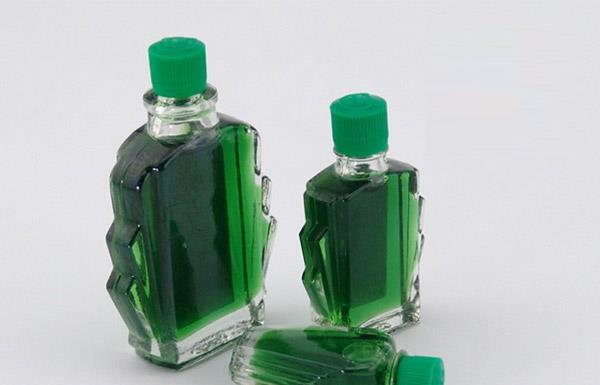
Do you have a habit of using wind oil when taking care of your children? Read through the pros and cons in this article!
Unpredictable side effects
There is no denying the common effects of wind oil such as pain relief, relieving itching ... but did you know that all essential oils are not for children under 3 months old? The age limit has also been increased for essential oils with menthol. Even with older children, baby's skin is sometimes still very sensitive and easily irritated compared to adults. Meanwhile, active methyl salicylate can heat up, cause blistering, and congestion of the skin. Menthol also increases sweating and lowers body temperature. Another dangerous side effect is inhibition of the respiratory system 's ability to function. If using wind oils to apply on the nose, the active ingredients in the oil can tear the mucous membranes of the nose and throat. Menthol inhibits the smooth mechanisms of respiration and circulation. Another ingredient in some oils is camphor (camphor) that inhibits circulation, causing respiratory failure, leading to cardiac arrest, apnea.
Limitations to note
When you want to use wind oil for your children, you should pay attention to the age, when to use it, how to apply the oil and the concentration of essential oils.
Baby's age: The minimum age of using essential oils is generally 3 months old. Essential oils containing methyl salicylate and menthol should be used with caution in children over 2 years old.
Concentration: Pure essential oils are often mixed with base oil to form a suspension. Mother should note that the concentration does not exceed 2%. Pure essential oils should never be placed on the skin as it can cause severe burns.
When to use wind oil: Some symptoms such as stuffy nose, headache, mild cough, abdominal pain, flatulence, muscle aches, sprains, insect bites itchy ... can be alleviated with oils wind.
How to use essential oils: Wind oil can only be used on the skin. Mother does not apply wind oil to the scratched skin, does not give the baby oil because it can damage the intestinal mucosa. Always take an appropriate amount, use it only when the pain is and should go away as soon as the pain is gone.
The table references the names of essential oils that can be used by age
-Baby from 3 months of age: chamomile essential oil, hay, lavender, dill
-Baby 6 months old onwards: bergamot, cinnamon, lemon, grapes, lemongrass, coriander, fir needles, pine, tangerine, grapefruit, geranium, a small amount of pine oil ...
-Baby from 2 years old: basil, black pepper, cloves, basalm, frankincense, garlic, lemongrass, patchouli, tea tree, oregano, mint ...
-Baby from 6 years old: anise, cajeput, cardamom, mint oil, nutmeg, laurel ...
-Baby from 10 years old: rosemary, eucalyptus
Baby care: Basic first aid you need to know
1. When your child is electrocuted
With children in the house, mothers need to be very careful with the power supply. If the child hits the power outlet and gets shocked, the first thing you need to do is quickly separate the baby from the power source by wearing boots, standing on a wooden board, disconnecting the power, using a dry tree to separate the transmitters from the baby. .
After the baby is isolated from the power source, the mother should take the baby to the hospital for examination. The baby may still be out of the ordinary, but internal bodily damage is unpredictable.
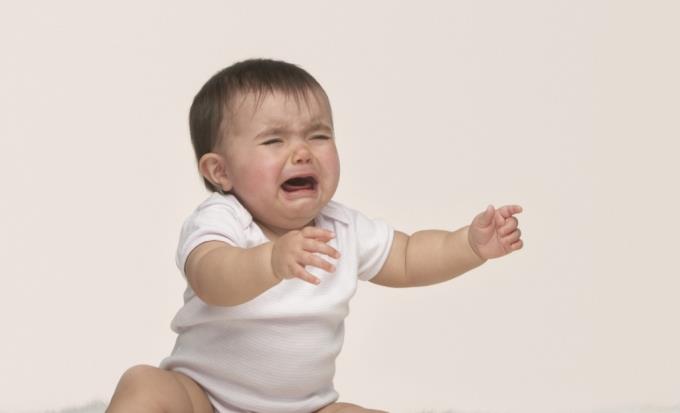
Young children are prone to accidents if their parents neglect it
2. What to do when a baby is bitten by a snake?
When a child is bitten by a snake, if he / she does not provide timely and proper first aid, the child can die quickly due to complications of respiratory failure, blood clotting disorder, and multi-organ failure. At this point, the mother must immediately wash the baby's wound under the tap water, then use a sterile gauze to apply it on the snake-bitten area. Raise and keep the body part bitten by a snake, take the child to the hospital immediately. Do not follow any folk tricks to avoid aggravating the situation.
3. Take care of your baby: When the child is bitten by a dog
Use soap to wash your dog's bite under running water, dry it, then disinfect with an antiseptic solution. If the blood does not come out too much, the mother can use a sterile thin gauze to apply temporarily while taking the baby to the hospital.
4. Children with heatstroke
In hot weather, you can sunbathe your child before 8:00 am, but if you play outdoors a lot, you can easily get sunstroke. When detecting signs of hyperthermia, dizziness, dizziness, and sweating, the mother should quickly put the baby in the shade, give the baby a sip of water, so that the baby will recover slowly. Should not immediately take the baby into the cold room suddenly, as this only weakens the baby's body.
5. Handling when bee stings and insect bites
The first thing you need to do is wash the affected area. Apply ice to relieve pain and swelling. Quickly take the child to the hospital immediately.
6. Take care of baby when the baby falls and scratches the skin
Mother used clean water to clean the scratches, continued to disinfect with alcohol, betadine, hydrogen peroxide, purple medicine, then bandaged with a bandage or sterile gauze. If the scratch is too big, the bleeding is too much, the mother should loosen the bandage, take the baby to the hospital.
7. When your child has a sprain
Instead of using hot oil to massage, mothers should take care of the baby by using ice to apply the sprained limbs of the baby. If the condition does not improve, the baby hurts more, cries more, the sprains are bruised, swollen, the mother needs to take the baby to visit for prompt monitoring and treatment.
8. Give first aid when a child is burned
You should take care of your baby by immediately cooling the burned skin under cool running water. Absolutely do not use ice to apply, apply fish sauce or toothpaste, because these methods only make the burns brittle and damage worse, increasing the risk of infection.
If your baby only has minor burns, mothers can apply nourishing oil or penthanol to relieve pain for the baby. Take your baby to the hospital right away if he or she has a fever, signs of infection due to the burn being too large.
9. The child has swallowed an object or a bone
In this case, the mother should not arbitrarily give first aid with folk tips, such as swallowing rice, bananas ... Instead, she should quickly take the child to the hospital, because for a long time, the bones are pushed down deeper, difficult to remove, causing many dangerous complications such as abscesses, perforation of the esophagus, sepsis ...
10. Nose related accident
A nosebleed in a young child is probably just a normal phenomenon. However, the mother still has to give first aid promptly, because maybe there are still serious risks. Let your baby bow forward, use his fingers to press the sides of his nose to stop the bleeding, and prevent the baby from swallowing blood.
If the child puts a foreign object into the nose, especially the battery, the mother should take care of the baby by going to the emergency room to prevent burns of the nasal mucosa, causing puncture, leaving many serious sequelae.
11. An insect or foreign object gets in the ear
When a child gets into the ear by an insect or foreign object, the mother should not poke around with tweezers or a cotton swab, because the risk of tearing the eardrum and pushing the object deeper is very high. Instead, the baby should be taken to the hospital. Especially in the case of insects entering the child's ears, mothers can provide first aid by placing hydrogen peroxide, a solution of glycerine or cooking oil on the baby's ear. This will help prevent insects that are still alive, fidgeting and flee from the baby's ears.
12. Foreign matter or insect gets in the eye
Encourage your child to blink repeatedly, administering saline to push the object out. Absolutely do not let children rub their eyes, rub their eyes in their hair to avoid making the situation worse.


















